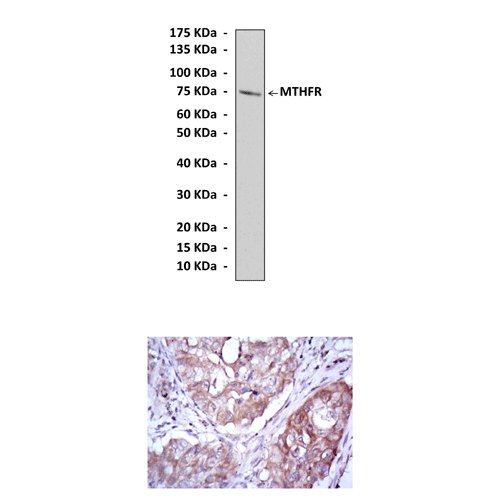Anti-MTHFR: Mouse MTHFR Antibody
Mouse MTHFR Antibody: Mouse MTHFR Antibody
Size: 100 ul
Price: $457.00
Description
Two common polymorphisms in the MTHFR gene, a C to T transition at nucleotide 677 (C677T), and an A to C transversion at position 1298 (A1298C), are associated with a 50% to 60% decrease in catalytic activity.2 The T677 variation causing alanine to valine substitution at the codon 222 affects the catalytic MTHFR domain leading to a thermolabile enzyme with reduced catalytic activity. Homozygosity for valine 222 predisposes to the development of hyperhomocysteinemia, especially during times of folate insufficiency. A C1298 variation causing the replacement of glutamate by alanine at the codon position 429 affects regulatory MTHFR domain. Homozygosity for alanine 429 is associated with lower enzymatic activity but does not seem to influence homocysteine plasma levels, except when accompanied by T677 mutation. MTHFR variants T677 and C1298 play a role in the development of neural tube defects and have been positively associated with vascular disease due to an increase in homocysteine levels. The association of these variants with a variable risk of neoplasia was shown in several studies. Homozygotes TT at position 677 have a reduced incidence of colorectal cancer that can be further modified by dietary habits and lifestyle. In contrast, an increased frequency of TT677 homozygotes was observed in cervical intraepithelial neoplasia and esophageal, endometrial, as well as certain forms of breast carcinoma. A relationship between plasma folate levels, the content of uracil, and DNA damage in dividing cells renders the MTHFR gene a suitable candidate for studies of leukemia susceptibility.3
2. Trabetti, E.: J. App. Genet. 49:267-82, 2008
3. Lightfoot, T.J. et al: Br. J. Haematol. 149:797-8, 2010
Details
| Cat.No.: | CP10389 |
| Antigen: | Raised against recombinant human MTHFR fragments expressed in E. coli. |
| Isotype: | Mouse IgG1 |
| Species & predicted species cross- reactivity ( ): | Human, Rat |
| Applications & Suggested starting dilutions:* | WB 1:1000 IP n/d IHC 1:50 – 1:200 ICC n/d FACS n/d |
| Predicted Molecular Weight of protein: | 75 kDa |
| Specificity/Sensitivity: | Detects MTHFR proteins in various cell lysate. |
| Storage: | Store at -20°C, 4°C for frequent use. Avoid repeated freeze-thaw cycles. |
*Optimal working dilutions must be determined by end user.




